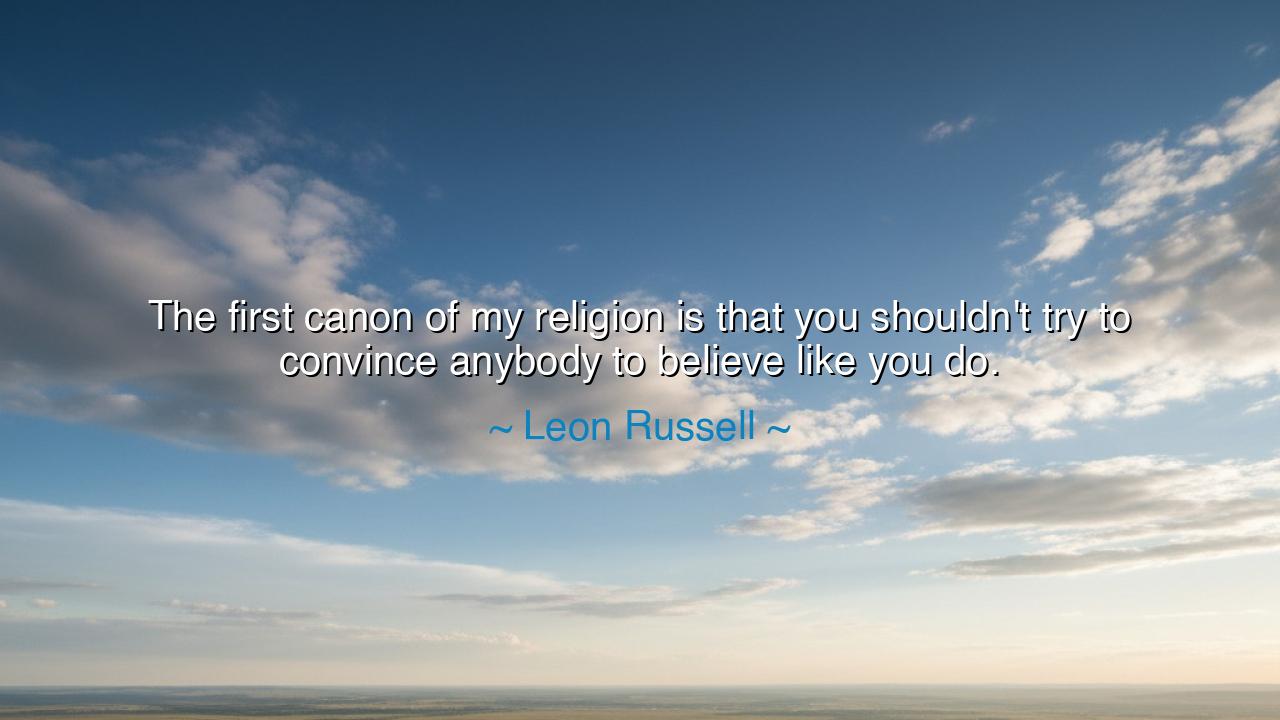
The first canon of my religion is that you shouldn't try to
The first canon of my religion is that you shouldn't try to convince anybody to believe like you do.






“The first canon of my religion is that you shouldn’t try to convince anybody to believe like you do.” — so spoke Leon Russell, the wandering troubadour, the poet-musician whose voice carried both fire and gentleness. His words are not the creed of a preacher, but the quiet wisdom of a man who had looked deeply into the human soul and seen how often belief becomes a battlefield. In this simple yet profound statement, Russell gives us a teaching older than temples and as fresh as dawn: that faith, when it is true, does not need to conquer, for truth stands best when it is free.
The origin of this quote can be found in the spirit of Leon Russell himself — a man of deep artistic and spiritual independence. He was no theologian, yet his life was a kind of worship: a devotion to music, freedom, and the sacred individuality of every soul. Like the wandering sages of old, Russell lived between worlds — gospel and rock, spirit and rebellion, solitude and community. He saw how religion, meant to lift mankind toward the divine, had too often become a contest of persuasion, a struggle to prove one’s way as the only way. Out of this insight was born his first canon — that faith should be lived, not enforced; shared, not imposed.
To understand this, we must look deeper into the nature of belief. When Russell says that one should not try to convince others, he is not rejecting truth — he is defending its purity. For truth that must be forced upon another is no longer truth, but tyranny. The heart cannot be commanded; it must awaken on its own. The light of understanding is not kindled by argument, but by example. Thus, Russell’s “religion” is not of doctrine, but of humility — a recognition that the path to the divine is as diverse as humanity itself, and that no one man can claim to possess it entirely.
History itself bears witness to this wisdom. Think of Emperor Ashoka of ancient India, once a conqueror drenched in blood, who after his transformation through Buddhism proclaimed a new law: that no one should denounce the faith of another, for all paths, if walked with sincerity, lead toward goodness. In the ashes of war, he saw what Leon Russell saw through song — that belief cannot be born through domination. The emperor’s stone edicts, carved thousands of years ago, echo Russell’s gentle creed: that faith should unite, not divide; that the measure of spirituality lies not in conversion, but in compassion.
Yet this lesson remains ever unlearned. Even today, men and nations seek to persuade through power, to impose their creeds upon others, to silence what is different. They mistake certainty for strength, forgetting that the divine is too vast for one voice alone. When religion becomes a weapon of persuasion, it loses its soul; when faith becomes conquest, it becomes corruption. But when belief is carried with gentleness — when one lives by example rather than argument — it becomes illumination, a light that draws others without demand. The tree does not beg the traveler to rest beneath its shade; it simply stands, and offers what it is.
This is the heart of Russell’s teaching. His “first canon” is not only a rule of faith, but a rule of life. It teaches us to listen more than we speak, to love without condition, and to honor the sacred freedom of every heart. To live this way is to become a sanctuary for peace. When you cease to convince, you begin to understand; when you release the need to control, you begin to love. For love — not persuasion — is the truest form of faith.
So, my child, remember this: let your belief be a beacon, not a burden. Do not preach it upon the unwilling, nor wield it as a sword against those who differ. Live it quietly, fully, beautifully, until others feel its truth in your presence. The flame of conviction burns brightest when it is steady and still. When you allow others their own way to the divine, you honor the divinity within yourself.
In the end, Leon Russell’s words remind us of the highest truth: that faith is not ownership — it is experience. The divine does not belong to one, but to all. To live by this creed is to walk in peace with the world — not as a conqueror of minds, but as a servant of the spirit, whose only mission is to live sincerely and let that sincerity speak for itself. For what greater testimony is there than a life that needs no defense, a soul that shines without preaching, and a heart that believes — quietly, freely, and with love?






AAdministratorAdministrator
Welcome, honored guests. Please leave a comment, we will respond soon